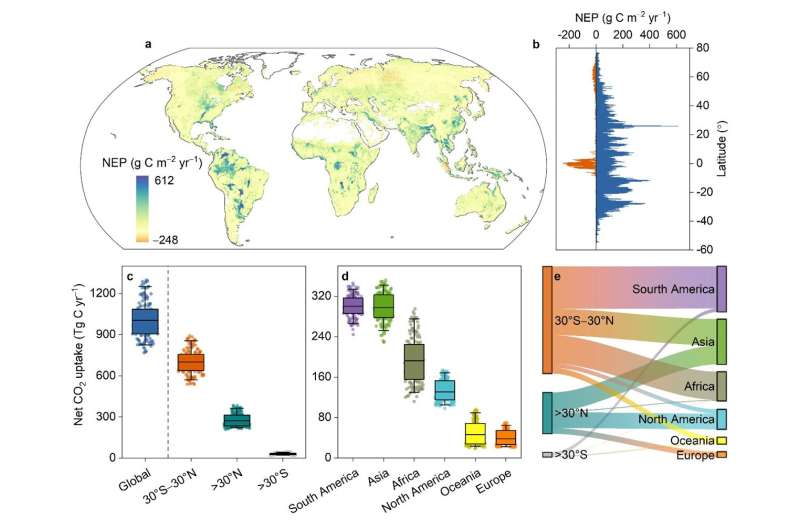Science
New Study Reveals Wetlands’ Critical Role in Carbon Storage

A recent study led by Prof. Ding Weixin from the Chinese Academy of Sciences has unveiled significant findings regarding the role of wetlands in global carbon sequestration. The research, published in the journal Nature Ecology & Evolution, emphasizes the necessity of incorporating wetland dynamics into global carbon budget models to improve climate change response strategies.
Wetlands, though covering only 3% to 13% of Earth’s land surface, are responsible for storing more than 30% of global soil carbon. Despite their importance, the spatiotemporal patterns of wetland carbon uptake have not been adequately quantified. This gap has hindered the development of effective wetland management policies and accurate estimations of land carbon sinks.
To address this issue, the research team utilized a newly developed dynamic global wetland water level dataset to assess carbon sequestration from 2000 to 2020. They compiled a total of 934 in situ observations from 258 peer-reviewed publications and the FLUXNET database. Their analysis revealed a global mean wetland net ecosystem production (NEP) of 56.4 g carbon m ‒2 year ‒1.
Key Findings on Carbon Sequestration
The study estimated that global wetland carbon sequestration averaged 1,004 Tg carbon annually during the 20-year period, with tropical wetlands contributing a significant 70% of this total. South America, Asia, and Africa emerged as the top three continents for wetland carbon sequestration, collectively accounting for 79% of global totals.
Notably, the study identified a decline in global wetland carbon sinks until 2005, followed by a recovery phase. Overall, carbon sequestration remained relatively stable over the two decades, with increases in northern mid to high latitudes counterbalancing declines in tropical and southern mid to high latitudes.
At a continental level, wetland carbon sequestration in South America decreased throughout the study period, which offset gains made in Africa, North America, Asia, and Europe.
Impact of Climate Change on Wetland Carbon Sinks
The researchers indicated that changing hydrology is a primary driver behind the increasing regional variability in wetland carbon sinks. The intensification of hydrological extremes, attributed to climate change, poses a risk to the resilience of these carbon sinks and the ecosystem services they provide.
Additionally, the study highlighted that terrestrial carbon sink growth rates have slowed, dropping from 0.075 Pg C yr ‒2 during 1980-1999 to 0.037 Pg C yr ‒2 from 2000 to 2020. The findings suggest a positive correlation between global wetland carbon uptake and terrestrial carbon sinks, explaining 33% of the temporal variations in terrestrial carbon sinks.
These results provide fresh insights into the dynamics of wetland carbon sequestration, emphasizing its role in moderating the growth of global terrestrial carbon sinks in recent decades. The research contributes valuable data to global carbon evaluation reports, including those from the Intergovernmental Panel on Climate Change.
In summary, the findings from this comprehensive study underscore the critical importance of wetlands in managing carbon emissions and highlight the need for informed policies that support wetland conservation and restoration.
-

 Entertainment3 months ago
Entertainment3 months agoAnn Ming Reflects on ITV’s ‘I Fought the Law’ Drama
-

 Entertainment4 months ago
Entertainment4 months agoKate Garraway Sells £2 Million Home Amid Financial Struggles
-

 Health3 months ago
Health3 months agoKatie Price Faces New Health Concerns After Cancer Symptoms Resurface
-

 Entertainment3 months ago
Entertainment3 months agoCoronation Street’s Carl Webster Faces Trouble with New Affairs
-

 Entertainment2 weeks ago
Entertainment2 weeks agoCoronation Street Fans React as Todd Faces Heartbreaking Choice
-

 Entertainment3 months ago
Entertainment3 months agoWhere is Tinder Swindler Simon Leviev? Latest Updates Revealed
-

 World2 weeks ago
World2 weeks agoBailey Announces Heartbreaking Split from Rebecca After Reunion
-

 Entertainment4 months ago
Entertainment4 months agoMarkiplier Addresses AI Controversy During Livestream Response
-

 Science1 month ago
Science1 month agoBrian Cox Addresses Claims of Alien Probe in 3I/ATLAS Discovery
-

 Health5 months ago
Health5 months agoCarol Vorderman Reflects on Health Scare and Family Support
-

 Entertainment4 months ago
Entertainment4 months agoKim Cattrall Posts Cryptic Message After HBO’s Sequel Cancellation
-

 Entertainment3 months ago
Entertainment3 months agoOlivia Attwood Opens Up About Fallout with Former Best Friend





















